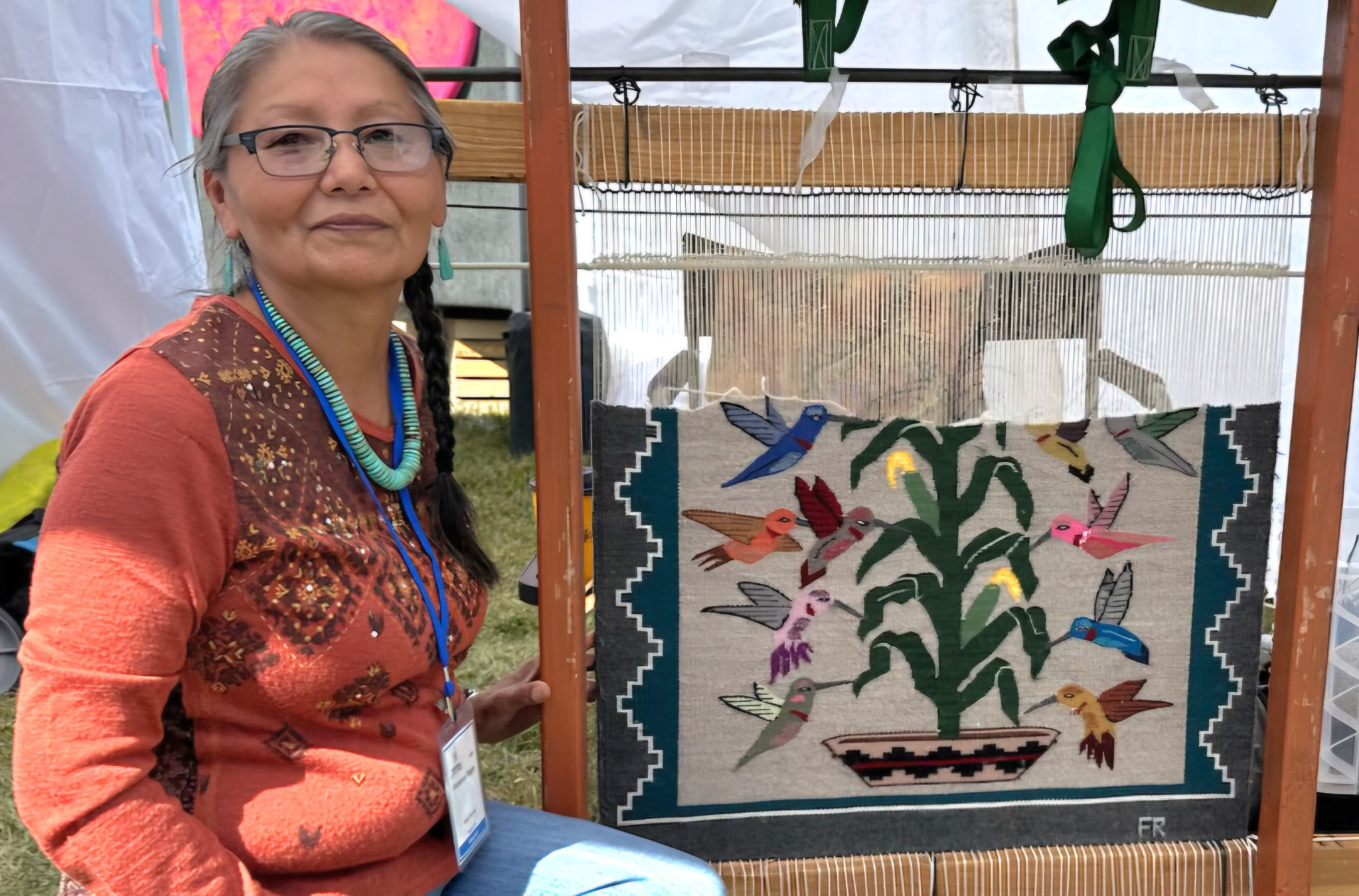
- Details
- By Native News Online Staff
On July 17, 2025, Ceann Comhairle Verona Murphy TD, Speaker of the Irish Parliament, accepted a traditional, handwoven Navajo rug on behalf of the Houses of the Oireachtas and the people of Ireland. The rug was a gift from Yee Ha’ólníi Doo, also known as the Navajo & Hopi Families COVID-19 Relief Fund, presented in appreciation of the Irish people's extraordinary support for Navajo and Hopi communities during the pandemic and in recognition of the enduring bonds between Indigenous and Irish communities.
The rug was personally delivered to Leinster House in Dublin by Yee Ha’ólníi Doo Board Chair Ethel Branch, Interim Executive Director Mary Francis, and Board Treasurer Vanessa Tullie. Their visit to Ireland included several stops across the country to share the story behind the gift and to deepen cultural connections between their communities and the Irish people.
“It’s a great honour to accept this wonderful piece of art on behalf of the Houses of the Oireachtas and the Irish people. It’s a tangible reminder that empathy with another’s plight can cross a vast ocean and that even small acts of kindness can make a lasting impact,” said Ceann Comhairle Verona Murphy TD.

Florence Riggs, a Diné pictorial rug weaver with over 44 years of experience, sits beside her loom and one of her handwoven creations. In 2020, Yee Ha’ólníi Doo commissioned Riggs to weave a Navajo rug over the course of a year as a gift to the people of Ireland, honoring 178 years of Indigenous and Irish solidarity. Woven on the Navajo Nation using lambswool and traditional designs passed down from her mother and grandmother, the rug features a Tree of Life, Navajo wedding basket motifs, and a rendering of the Kindred Spirits monument in Midleton, County Cork, Ireland. (Photo/Courtesy)
“I am so overjoyed with completing our journey with this rug. It carries so much history, reciprocity, and meaning. This exchange highlights how historical compassion and love for fellow humankind can transcend time and borders,” said Mary Francis, Yee Ha’ólníi Doo Interim Executive Director.
“Ahéhee’, this journey was guided by gratitude. I’m deeply honored to join in delivering this offering to the Irish people," said Vanessa Tullie, Co-Founder and Board Treasurer. "This moment, made possible by persistence and a touch of Irish luck, celebrates the centuries-long bonds between our peoples.”
The gift continues a remarkable 178‑year legacy of Indigenous–Irish solidarity. In 1847—just 16 years after their forced removal along the Trail of Tears—the Choctaw Nation pooled its scarce resources to send $170 to assist Irish communities during the Great Famine, an amount equivalent to roughly $5,000 today
That spirit of empathy was reignited in 2020 when Ethel Branch co-founded the Navajo & Hopi Families COVID‑19 Relief Fund to support communities facing one of the highest per-capita infection rates in the U.S., where many lacked running water and suffered from chronic health vulnerabilities
The campaign received international attention, especially in Ireland, where donations poured in—not just in dollars but messages of remembrance. One such message referenced that “173 years later … the favour is returned through generous donations from the Irish people to the Navajo Nation during our time of crisis”
A key moment came when Aaron Yazzie, a Navajo NASA engineer, shared the story on Twitter. His post helped amplify the connection between the two histories—highlighting how Indigenous generosity toward the Irish in 1847 now inspires Irish generosity toward Navajo and Hopi communities in 2020.
“The Navajo Nation has more confirmed cases per capita of COVID-19 than 48 US states! Navajo has depleted all of her limited resources to battle. Funding to fight is now grassroots fundraising help if you can: Navajo & Hopi Families COVID-19 Relief Fund.”
Naomi O’Leary, Europe Correspondent for the Irish Times, amplified the call:
“Native Americans raised a huge amount of famine relief for Ireland at a time when they had very little. It’s time for us to come through for them now.”
That digital moment sparked a wave of support. Between 2020 and 2025, Irish donors contributed tremendous funds that were used to provide food, water, PPE, and essential supplies to more than 500,000 Navajo and Hopi people.
To honor that spirit of compassion, in 2020 the Yee Ha’ólníi Doo board and staff commissioned a fully hand‑woven gift rug for the people of Ireland. Created over the course of one year on the Navajo Nation, it was woven by Florence Riggs, a master Navajo pictorial weaver with over 44 years of experience, who learned the craft from her mother and grandmother.
More Stories Like This
Native News Weekly (August 25, 2024): D.C. BriefsMonday Morning (March 2, 2026): Articles You May Have Missed This Past Weekend
Native News Weekly (March 1, 2026): D.C. Briefs
Scope Narrowed, Report Withheld: Questions Mount Over Michigan Boarding School Study
Zuni Youth Enrichment Project Announces Family Engagement Night and Spring Break Youth Programming
Help us defend tribal sovereignty.
At Native News Online, our mission is rooted in telling the stories that strengthen sovereignty and uplift Indigenous voices — not just at year’s end, but every single day.
Because of your generosity last year, we were able to keep our reporters on the ground in tribal communities, at national gatherings and in the halls of Congress — covering the issues that matter most to Indian Country: sovereignty, culture, education, health and economic opportunity.
That support sustained us through a tough year in 2025. Now, as we look to the year ahead, we need your help right now to ensure warrior journalism remains strong — reporting that defends tribal sovereignty, amplifies Native truth, and holds power accountable.
 The stakes couldn't be higher. Your support keeps Native voices heard, Native stories told and Native sovereignty defended.
The stakes couldn't be higher. Your support keeps Native voices heard, Native stories told and Native sovereignty defended.
Stand with Warrior Journalism today.
Levi Rickert (Potawatomi), Editor & Publisher


